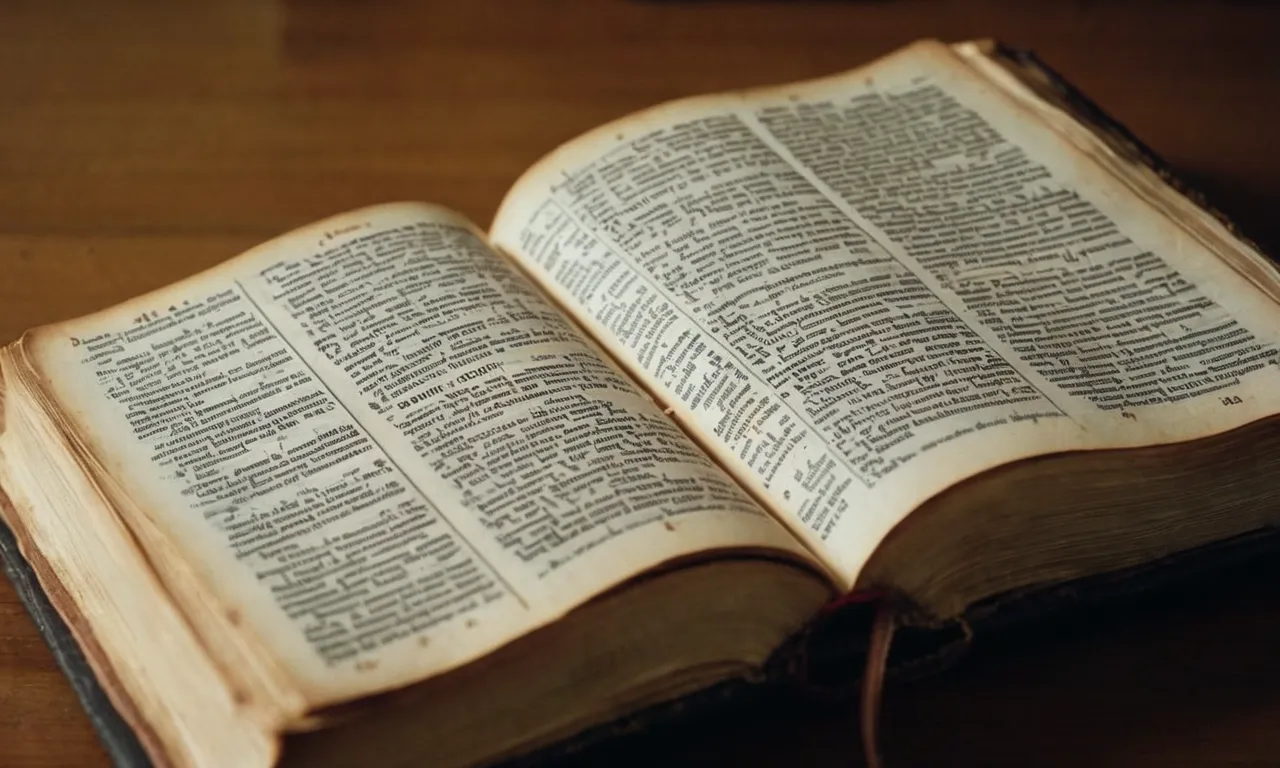When Was The Apocrypha Removed From The Bible?
The question of when the Apocrypha was removed from the Bible is an important one for understanding the formation of the modern Protestant Bible.
If you’re short on time, here’s a quick answer: The Apocrypha was first removed from the King James Bible in 1611 and has largely remained out of Protestant Bibles ever since.
In this comprehensive article, we’ll trace the complex history of the Apocrypha’s inclusion and exclusion from Bibles through the centuries.
We’ll look at key events like the Protestant Reformation, the creation of the King James Bible, and the standardization of the Protestant canon that led to the Apocrypha’s final removal.
The Origins and Contents of the Apocrypha
Definition and Etymology of ‘Apocrypha’
The word “apocrypha” comes from the Greek word meaning “hidden” or “secret”. In the context of the Bible, the Apocrypha refers to a collection of ancient books found in some versions of the Bible, but not considered authoritative Scripture by Protestant Christians.
The Apocryphal books were likely written between 200 BC and AD 100. They were included in the ancient Greek translation of the Hebrew Bible called the Septuagint, which was used by Greek-speaking Jews at the time.
Origins of the Apocryphal Books
Most scholars believe the Apocryphal books originated from Jewish authors in the intertestamental period. However, there is uncertainty around the exact origins of some Apocryphal books. For example:
- Tobit and Judith likely came from Aramaic or Hebrew works, now lost
- Wisdom of Solomon may have been composed in Greek
- The origins of Baruch and Letter of Jeremiah are more obscure
In the early Christian church, the Apocrypha was treated inconsistently. The status of the Apocryphal books was debated up until the Protestant Reformation in the 16th century, when Protestant leaders officially rejected the Apocrypha from the Old Testament canon.
Key Contents of the Apocryphal Books
The Apocryphal books contain a variety of stories and wisdom teachings. Some of the key contents include:
| 1 Maccabees | – History of the Maccabean revolt against Syrian oppressors |
| 2 Maccabees | – Another account of the Maccabean revolt focusing on martyrdom |
| Additions to Esther and Daniel | – Expanded stories from the biblical books |
| Wisdom books | – Philosophical and spiritual teachings about wisdom, virtue, justice etc. |
| Tobit and Judith | – Religious tales and hero stories |
While the Apocrypha has historical value, most Protestant Christians do not consider these books to be the inspired word of God. So the Apocrypha was officially removed from Protestant Bible versions starting in the 19th century.
The Apocrypha in Early Bibles and the Early Church
The Septuagint, a Greek translation of the Hebrew Bible produced in the 3rd-2nd centuries BCE, contains the books of the Apocrypha interspersed among the other books.
This reflects the fact that the Apocrypha was considered part of the canon by Alexandrian Jews.
The Vulgate, Jerome’s 4th century Latin translation of the Bible endorsed by the Catholic Church, also includes the Apocrypha.
Their presence in these highly influential early translations contributed to their being treated as scripture in early Christianity.
Apocryphal Books Considered Canonical by Early Christians
While some early Church Fathers like Origen and Athanasius opposed the canonicity of the Apocrypha, many others affirmed all or most of the Apocryphal books as scripture.
Even some early Reformers like Luther initially accepted the divine authority of books like Tobit and 1 Maccabees. So there is evidence of widespread, though not universal, acceptance of the Apocrypha in early Christianity.
Disagreements over the Apocrypha’s Authority
Despite the Apocrypha’s inclusion in important early Bible translations and some acceptance by the Church Fathers, there was never full agreement on the divine authority of these books.
Jerome argued against their canonicity, and they were treated as a separate category of writings by Athanasius and in the Cheltenham Canon list.
Disagreements over the Apocrypha were inflamed during the Reformation when Protestants rejected the Apocrypha as lacking divine authority, in contrast to the Catholic church which affirmed it at the Council of Trent.

The Apocrypha Today: Modern Editions and Perspectives
The Apocrypha in Catholic and Orthodox Bibles
The Apocryphal books continued to be included in Catholic and Orthodox Bibles after the Reformation. The Council of Trent in 1546 confirmed this tradition, declaring the Apocrypha to be inspired Scripture.
Today, Catholic and Orthodox Bibles contain the full Apocrypha interspersed between the Old and New Testaments. Popular modern editions like the New American Bible include these books.
Protestant Perspectives on the Apocrypha Since the Reformation
Most Protestant Bibles continued excluding the Apocrypha after the Reformation. However, perspectives shifted in some Protestant circles.
And in 1895, the declaration from an international gathering of Protestant churches in Canterbury acknowledged the Apocryphal books as useful for “example of life and instruction of manners.”
Today, the Apocryphal books are occasionally included in Protestant Bibles, but usually relegated to a separate section between the Old and New Testaments.
For example, the New Revised Standard Version includes the Apocrypha but notes: “The books and sections of books designated ‘Apocrypha’ are recognized as Deuterocanonical Scripture by Roman Catholic, Greek and Slavonic Orthodox, and other Churches.”
Modern Ecumenical Efforts Regarding the Apocrypha
In more recent decades, efforts towards unity between Catholic, Orthodox and Protestant churches has led to further discussion on differences like the status of the Apocrypha.
Documents from the Second Vatican Council of the Catholic Church (1962-1965) expressed optimism about coming to agreement on the matter.
However, significant differences still remain.
For example, a collection of joint ecumenical statements in 1982 from Catholic and Lutheran theologians affirmed: “there are no differences so great that they cannot be surmounted, if both sides begin from the foundation of their unity in Jesus Christ.”
Yet regarding the Apocrypha specifically, it concluded differences “should not be ignored or denied, but rather frankly acknowledged.” So while mutual understanding has deepened, the divide persists between traditions on this issue.
Conclusion
The Apocrypha’s removal from Protestant Bibles was not a single event, but rather the culmination of centuries of debate over its role and authority.
While modern Protestants and Catholics still disagree on the Apocrypha’s status, its value as an ancient source shedding light on the intertestamental period is undisputed.
This complex history continues to impact biblical scholarship and ecumenical relations to this day.








